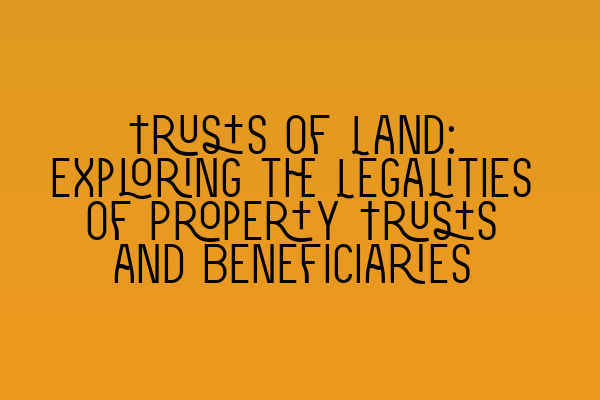Trusts of Land: Exploring the Legalities of Property Trusts and Beneficiaries
Welcome to another informative blog post from SQE Property Law & Land Law. In today’s topic, we will be delving into the world of trusts of land, uncovering the legalities surrounding property trusts and beneficiaries. Whether you are an aspiring solicitor, a property owner, or simply someone interested in property law, this article aims to provide you with a comprehensive understanding of trusts of land.
Before we delve deeper into the legal intricacies of property trusts, let’s briefly establish what a trust is. In its essence, a trust is a legal arrangement where one person, known as the settlor, transfers the ownership of assets to another person or a group of people, known as the trustees. The trustees hold the assets on behalf of the beneficiaries, who are the individuals entitled to benefit from the trust. Trusts are commonly used in estate planning, asset protection, and ensuring the efficient distribution of property.
Within the realm of trusts, there are various types, and one such type is a trust of land. A trust of land is created when land or property is placed in trust, with the trustees acting as legal owners of the property. The beneficiaries hold the equitable right to beneficial ownership of the property. This type of trust can be particularly useful in situations where property needs to be managed or held for the benefit of specific individuals or groups.
Now that we have established the foundation, let’s explore the legalities involved in trusts of land in more detail.
1. Creation of Trusts of Land:
Trusts of land can be created in various ways, such as through a written trust deed, a declaration of trust, or even through an implied trust. It is essential to ensure that the creation of the trust follows the necessary legal formalities to be valid and enforceable. Seek legal advice when creating a trust of land to ensure compliance with the law and to protect the interests of all parties involved.
2. Trustees’ Duties and Powers:
Trustees have important roles and responsibilities when it comes to trusts of land. They hold legal title to the property and must act in the best interests of the beneficiaries. Trustees have a duty to manage the property for the benefit of the beneficiaries, including ensuring its maintenance, making decisions about its use, and handling any financial transactions related to the property. Additionally, trustees possess specific powers as outlined in the trust instrument or granted by legislation.
3. Beneficiaries’ Rights and Entitlements:
As beneficiaries of a trust of land, individuals have certain rights and entitlements. They possess an equitable interest in the property, which includes the right to occupy, use, and receive income from the property. Beneficiaries may have various beneficial interests, such as a right to occupy the property for a specific period or a right to receive income generated by the property. It is essential for beneficiaries to understand their rights and seek legal advice if they believe their interests are not being properly protected.
4. Trusts of Land Disputes:
Like any legal arrangement, disputes can arise in trusts of land. Common disputes involve disagreements regarding the management of the property, the rights of beneficiaries, or the interpretation of the trust instrument. When disputes arise, it is crucial to seek legal assistance to ensure a fair resolution and the protection of your rights. Our SQE Property Law & Land Law team is well-equipped to handle such disputes and provide expert advice tailored to your specific circumstances.
In conclusion, trusts of land play a significant role in property law, providing a legal framework for the management and distribution of property. Understanding the legalities surrounding trusts of land, including the creation process, trustees’ duties and powers, beneficiaries’ rights, and how to resolve disputes, is essential for all parties involved.
We hope this blog post has shed some light on trusts of land, giving you a solid foundation to navigate this complex area of property law. For further information on related topics, we recommend checking out our other informative articles:
– [Updates in UK Property Laws: Key Changes and Implications](https://property-practice-law-sqe.co.uk/updates-in-uk-property-laws-key-changes-and-implications/)
– [Legal challenges in property transactions: A comprehensive guide](https://property-practice-law-sqe.co.uk/legal-challenges-in-property-transactions-a-comprehensive-guide/)
– [Navigating Lease Laws in the UK: Essential Guidelines for Tenants and Landlords](https://property-practice-law-sqe.co.uk/navigating-lease-laws-in-the-uk-essential-guidelines-for-tenants-and-landlords/)
– [Dominate Property Law Questions: Avoiding Common Pitfalls](https://property-practice-law-sqe.co.uk/dominate-property-law-questions-avoiding-common-pitfalls/)
– [Land Law Revision Tips: Ace Your Exam Preparation](https://property-practice-law-sqe.co.uk/land-law-revision-tips-ace-your-exam-preparation/)
At SQE Property Law & Land Law, we are dedicated to providing expert advice and assistance in all matters relating to property law. If you have any questions or require legal assistance, please do not hesitate to contact us. We are here to help you navigate the legal complexities of trusts of land and ensure the protection of your property interests.
